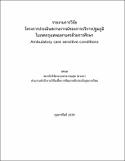บทคัดย่อ
Ambulatory Care Sensitive Conditions (ACSC) เป็นกลุ่มโรคหรือภาวะซึ่งหากได้รับการดูแลรักษาแบบผู้ป่วยนอกที่เหมาะสมแล้ว จะสามารถป้องกันการนอนพักรักษาตัวในโรงพยาบาลโดยไม่จำเป็นได้ การศึกษานี้จึงมีวัตถุประสงค์เพื่อประเมินสถานการณ์ของผลการดำเนินการของการบริการปฐมภูมิในเขตกรุงเทพมหานคร ด้วยการศึกษา ACSC โดยอาศัยตัววัด ACSC 13 กลุ่มโรคตามแบบของ Agency for Health Research and Quality (AHRQ) ของประเทศสหรัฐอเมริกา ทั้งนี้โดยประมวลข้อมูลจากฐานข้อมูลการเบิกจ่ายค่ารักษาพยาบาลระหว่างปี 2550-2557 จากระบบหลักประกันสุขภาพถ้วนหน้า (UC) ระบบสวัสดิการรักษาพยาบาลข้าราชการ (CSMBS) และระบบประกันสุขภาพ (SSS) ผลการศึกษา พบว่ามีความเป็นไปได้สูงและเป็นประโยชน์ในการนำสถิติการเข้ารับการรักษาตัวในโรงพยาบาลของผู้ป่วยตามกลุ่มโรคที่จัดเป็น ACSC มาใช้เพื่อประเมินสถานการณ์ของผลการดำเนินการของการบริการปฐมภูมิในเขตกรุงเทพมหานคร โดยสถิติของ ACSC แต่ละกลุ่มโรคมีความแตกต่างกัน ทั้งนี้พบว่าในปี 2554 ซึ่งเป็นปีที่มีข้อมูลสมบูรณ์ที่สุดสำหรับประชากรทุกกลุ่มสิทธิหลักประกันสุขภาพ สถิติACSC สูงสุด 3 อันดับแรกคือ Urinary Tract Infection, Congestive heart failure และ Adult asthma ตามด้วย Hypertension และ Angina without procedure ในขณะที่การรับเข้ารักษาในโรงพยาบาลด้วยเบาหวาน ทั้งกรณีภาวะแทรกซ้อนระยะสั้น และระยะยาวมีสถิติไม่สูงมากนัก การให้บริการผู้ป่วยในในกลุ่ม ACSC ในเขตกรุงเทพมหานคร โดยเฉพาะในกลุ่มประชากรสิทธิ UC ส่วนใหญ่ยังคงเป็นผู้ป่วยที่มีต้นสังกัดในเขตกรุงเทพมหานครเอง มากกว่าที่จะมาจากจังหวัดปริมณฑลหรือจังหวัดอื่นๆ โดยจำนวนและสัดส่วนการรับรักษาเป็นผู้ป่วยในมักจะเป็นกลุ่มที่สังกัดหน่วยบริการ (โรงพยาบาล) ภาคเอกชน มากที่สุดในกลุ่ม ACSC ส่วนใหญ่ ตามด้วยหน่วยบริการสังกัดกรุงเทพมหานครมีแนวโน้มว่ากลุ่มผู้ป่วย CSMBS ที่ได้รับการรักษาเป็นผู้ป่วยใน จะเป็นกลุ่มที่มีอายุมากกว่า UC และ SSS ในเกือบทุกกลุ่มโรค และรักษาในโรงพยาบาลในจำนวนมากกว่าในกลุ่มโรค Hypertension และ COPD อย่างไรก็ตาม มีข้อสังเกตว่าอาจไม่สามารถนำ ACSC มาใช้ได้ในทุกกรณี เนื่องจากปัญหาและอุปสรรคของการนำฐานข้อมูลดังกล่าวมาใช้ประโยชน์จากแหล่งข้อมูลอยู่ที่หน่วยงานที่รับผิดชอบที่แตกต่างกัน มีขั้นตอนการพิจารณาและความพร้อมในการสนับสนุนข้อมูลเพื่อการประมวลผลที่แตกต่างกัน ฐานข้อมูลมีคุณภาพแตกต่างกัน นอกจากนี้หลักการของการออกแบบระบบที่แตกต่างกันระหว่างประชากรที่ใช้สิทธิหลักประกันสุขภาพในเรื่องของการลงทะเบียน ทำให้ฐานการคำนวณแตกต่างกันไปด้วยโดยสรุป กล่าวคือ การพัฒนาระบบบริการปฐมภูมิในเขตกรุงเทพมหานครยังมีความจำเป็น โดยกลุ่มโรคที่มีความสำคัญโดยรวม คือ การดูแลผู้ป่วยกลุ่มโรคหัวใจและหลอดเลือด ทั้งนี้ควรมีการพัฒนาตัววัด ACSC ไปพร้อมกันกับคุณภาพของฐานข้อมูล เพื่อใช้เป็นเครื่องมือในการติดตามประเมินการเข้าถึงบริการ และคุณภาพของการดูแลสุขภาพระดับปฐมภูมิดังกล่าวต่อไป
บทคัดย่อ
Ambulatory Care Sensitive Conditions (ACSC) are disease groups or medical conditions
that, if patients are effectively taken care of in the ambulatory setting, hospital admissions can
be avoided or preventable. This study aimed to assess performances of primary-care provision
in the Bangkok area using 13 ACSCs set by Agency for Health Research and Quality (AHRQ),
USA. The analyses were conducted by using inpatient-service reimbursement databases from
2007 to 2014 of the Universal Coverage Scheme (UC), the Civil Servants Medical Benefit
Scheme (CSMBS) and the Social Security Scheme (SSS).
The study findings indicated that it was very likely to use ACSC statistics to assess
primary-care performances in the Bangkok area. Based on the year 2011 data which was the
most complete for all population groups, the Top 3 ACSCs were urinary tract infection,
congestive heart failure and adult asthma, respectively. The other close-call groups included
hypertension and angina without procedure. Surprisingly, the hospital admissions caused by
short-term and long-term complications of diabetes mellitus were not as high as expected.
ACSCs’ Inpatient services in the Bangkok area, particularly for the UC population, were
mainly for patients from Bangkok itself rather than those from vicinity provinces or other
provinces. It was worth noted that the amount and proportion of the hospital admissions in most
of the ACSCs were highest among patients registered with private providers (e.g. private
hospitals), followed by those registered under Bangkok Metropolitan’s provider network. It was
also found that the CSMBS patients tended to be in older than UC and SSS patients in almost all
ACSCs. They were also more likely to get admitted with Hypertension and COPD, compared to
the latter two groups.
Nevertheless, ACSC might not be applicable without restriction. There were problems
with the databases as they were from different responsible agencies with differing working
processes and data-processing capabilities. Quality of the databases varied somewhat.
Moreover, data analyses were affected by the fact that the three health schemes were designed
differently in terms of beneficiary registration.
In sum, primary-care services in the Bangkok area needed improvement. The most
significant ACSC target would be around heart and vascular diseases, along with the development of ACSC measures and quality of the databases such that they could be applied
in monitoring access to and quality of primary care.


